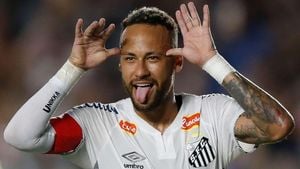A Polish official has recently voiced strong support for Ukraine, asserting its capability to withstand Russian aggression. Radoslaw Sikorski, the Polish Foreign Minister, expressed confidence during an interview with CNN, stating, "Ukraine can fight on its own with our European support through the end of this year, and I think Putin should take this seriously." He emphasized the importance of Ukraine's nearly million-strong army as the best guarantee of its security, particularly without reliance on U.S. assistance.
This assertion came alongside comments from Andriy Yermak, head of the Office of the President of Ukraine, who reiterated Ukraine's commitment to achieving a just and sustainable peace with "ironclad security guarantees." Yermak's statements align with the notion of Ukraine asserting its sovereignty and territorial integrity as non-negotiable aspects of any peace deal.
Meanwhile, on the diplomatic front, U.S. Special Envoy to the Middle East, Steve Vitkoff, highlighted the need for both Ukraine and Russia to make compromises for the possibility of reaching a peace agreement. During his appearance on CNN on February 23, Vitkoff noted, "You will see concessions from both sides. And that's what [President Donald Trump] does best. He brings people together. He helps them realize the path to peace is through concessions and compromise." This statement underlines the complexity and difficulty of achieving peace amid continued hostilities.
Vitkoff did not disclose the specifics of the potential peace agreement but hinted at the possibility of significant progress. He stated, "We are very close to signing something. The Istanbul agreement may serve as a benchmark for reaching a peace deal between Ukraine and Russia." The Istanbul agreement refers to negotiations held earlier in the conflict, which featured contentious terms for Ukraine, including the reduction of its military presence, ceding territories, and limiting aid from the West.
Despite urging for concessions, Vitkoff also assured audiences of the U.S.'s commitment to NATO’s Article 5, which guarantees mutual defense among NATO members. He stressed the importance of responding to any Russian aggression against NATO allies, thereby reaffirming U.S. support and the broader alliance’s collective security.
Both Sikorski and Vitkoff's statements highlight the shifting dynamics of the conflict, where military resilience and diplomatic efforts intersect. The Polish minister's perspective aligns with the sentiment prevailing among European nations, maintaining faith in Ukraine’s ability to defend itself for the foreseeable future. This belief is partly fueled by the backing from European nations, which Sikorski claims will persist.
The U.S. envoy's remarks signify potential diplomatic openings, yet they also signal the complicated nature of peace negotiations. With both sides needing to navigate their core interests—territorial integrity for Ukraine and security concerns for Russia—the road to peace appears fraught with challenges.
Ukrainian leadership remains firm on the necessity for security guarantees as prerequisites for any negotiations. Andriy Yermak pointedly remarked, "We are not ready to compromise on independence, territories, or sovereignty." This declaration exemplifies the resolve of Ukrainian officials to protect their nation's integrity amid complex geopolitics.
These narratives depict both the determination of Ukraine to defend itself and the cautious optimism of the U.S. about facilitating peace. Nevertheless, the ultimate question remains whether the proposed compromises discussed can yield tangible outcomes without undermining Ukraine’s sovereignty. The conflict continues to evolve as international stakeholders balance military and diplomatic strategies to expedite peace.



